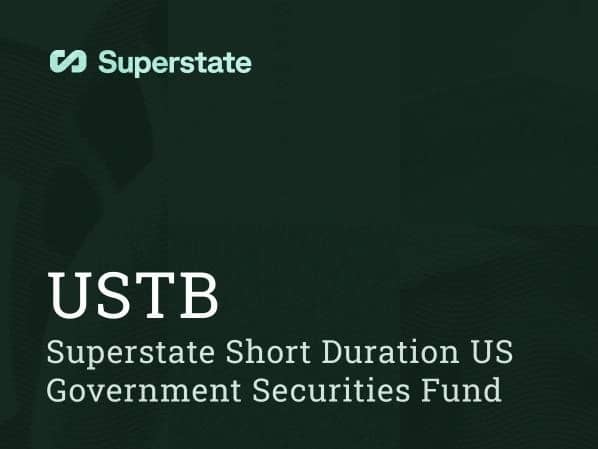Subscribe to wiki
Share wiki
Bookmark
USTB Fund
The Agent Tokenization Platform (ATP):Build autonomous agents with the Agent Development Kit (ADK)
USTB Fund
Superstate Short Duration U.S. Government Securities Fund (USTB) is a private fund tokenized on the Ethereum blockchain. It is designed to provide eligible investors with access to short-duration U.S. Treasury Bills and U.S. Government Agency securities, aiming for yields aligned with the federal funds rate [1] [2].
Overview
The Superstate Short Duration U.S. Government Securities Fund (USTB) operates as a tokenized investment product focusing on U.S. government debt. It is structured as a private fund and is primarily accessible to U.S. Qualified Purchasers and U.S. Accredited Investors [2]. The fund's investment strategy involves holding short-duration U.S. Treasury and U.S. Agency securities. The objective is to target returns that correspond with the federal funds rate [1]. The fund calculates a daily Net Asset Value (NAV) [2].
USTB represents an effort to bridge traditional financial assets with blockchain technology. By tokenizing the fund's shares, Superstate aims to enable on-chain ownership, transfer, and compliance for eligible investors. The fund's structure incorporates established service providers from both traditional finance and the digital asset space [3].
Technology
USTB is tokenized on the Ethereum blockchain, utilizing the ERC-20 token standard [1] [2]. The fund's operation incorporates an Ethereum-based Allowlist mechanism. This Allowlist is designed to manage on-chain ownership, facilitate token transfers, and ensure compliance with relevant regulations [3].
In addition to Ethereum, USTB tokens are also present on the Plume Network and are tracked as Off-Chain (Book-Entry) holdings [2]. The use of blockchain technology is intended to potentially enable features like peer-to-peer transactions among eligible participants in the future, subject to applicable restrictions [3].
Underlying Assets
The Superstate Short Duration U.S. Government Securities Fund invests in a portfolio of short-duration U.S. Treasury Bills and U.S. Government Agency securities [1] [3]. These are debt obligations issued or guaranteed by the U.S. government or its agencies. The fund's investment strategy is focused on short-duration instruments, which typically have maturities of one year or less for Treasury Bills and varying short-term durations for Agency securities. The fund aims to generate yield that corresponds to the prevailing federal funds rate [1].
Market Data and Tokenomics
As of July 2025, the Superstate Short Duration U.S. Government Securities Fund (USTB) has a market capitalization of approximately $688 to $689 million [3] [2]. The fully diluted valuation (FDV) is reported to be the same as the market capitalization, indicating that the circulating supply represents the total supply of tokens [3]. The circulating and total supply are approximately 64.1 to 64.8 million tokens [3] [2]. The maximum supply is listed as infinite [3].
The price of USTB is calculated by aggregating data across multiple exchanges and markets using a volume-weighted average formula. Due to limited recent trading activity, the reported price often reflects the last recorded value [3]. The 24-hour trading volume has been reported as $0.00, indicating low market activity and potentially low liquidity for the token on public exchanges [3].
Key historical price points include an all-time high of $10.74 reached on July 7, 2025, and an all-time low of $10.29 reached on February 26, 2025 [3]. The fund has a stated management fee of 0.15% [3] [2]. There are no stated performance, subscription, or redemption fees, although other organizational expenses are amortized [2].
The Total Value Locked (TVL) associated with Superstate USTB, as tracked by DefiLlama, represents the total amount of USTB and USCC minted on-chain, excluding book-entry AUM. As of July 2025, the TVL was approximately 216,067 ETH, distributed across Ethereum and Plume Mainnet [1]. Cumulative fees generated by the protocol were reported as 55.97 ETH [1].
Eligibility and Access
Access to the Superstate Short Duration U.S. Government Securities Fund (USTB) is restricted to eligible investors. Specifically, the fund is offered to U.S. Accredited Investors and U.S. Qualified Purchasers [2].
Investors meeting the eligibility criteria are able to subscribe to and redeem from the fund. Subscriptions can be made using USDC or USD [2]. The subscription process is available on U.S. banking daily basis [2]. There is a minimum investment requirement of 100,000 USDC [2]. Redemptions are processed at the daily NAV [3].
Service Providers
The Superstate Short Duration U.S. Government Securities Fund utilizes a range of service providers to manage its operations, spanning both traditional finance and digital asset domains. Key entities involved include:
- Manager and Protocol: Superstate [2]
- Sub-Advisor: NAV Consulting [2]
- Fund Administrator: NAV Consulting, responsible for calculating the daily NAV [3] [2]
- Custodian: UMB Bank, N.A. [2]
- Crypto Broker: Circle [2]
- Auditor: Ernst & Young LLP [2]
Legal and Regulatory
The Superstate Short Duration U.S. Government Securities Fund is domiciled in the United States of America [2]. It operates under the U.S. Securities Act Reg. D Exemption, which allows companies to offer and sell their securities without having to register them with the U.S. Securities and Exchange Commission (SEC), provided certain conditions are met [2]. The fund's issuer is listed as Superstate Asset Trust [2].
Performance
The fund's performance is linked to the yield generated by its underlying investments in short-duration U.S. government securities. The fund targets returns in line with the federal funds rate [1]. As of July 2025, the reported Net Asset Value (NAV) per token was $10.73 [2]. The fund's Annual Percentage Yield (APY) was reported as 4.07% [2].
Historical price data shows the token trading within a narrow range, consistent with its objective as a tokenized fund holding stable assets. The 7-day price range was $10.73 to $10.74, and the 24-hour range was also $10.73 to $10.74 [3].
Competitors
The Superstate Short Duration U.S. Government Securities Fund operates within the growing sector of tokenized real-world assets (RWA), specifically focusing on tokenized U.S. Treasury Bills. Other protocols and funds in this category or related RWA areas include:
See something wrong?
The Agent Tokenization Platform (ATP):Build autonomous agents with the Agent Development Kit (ADK)
